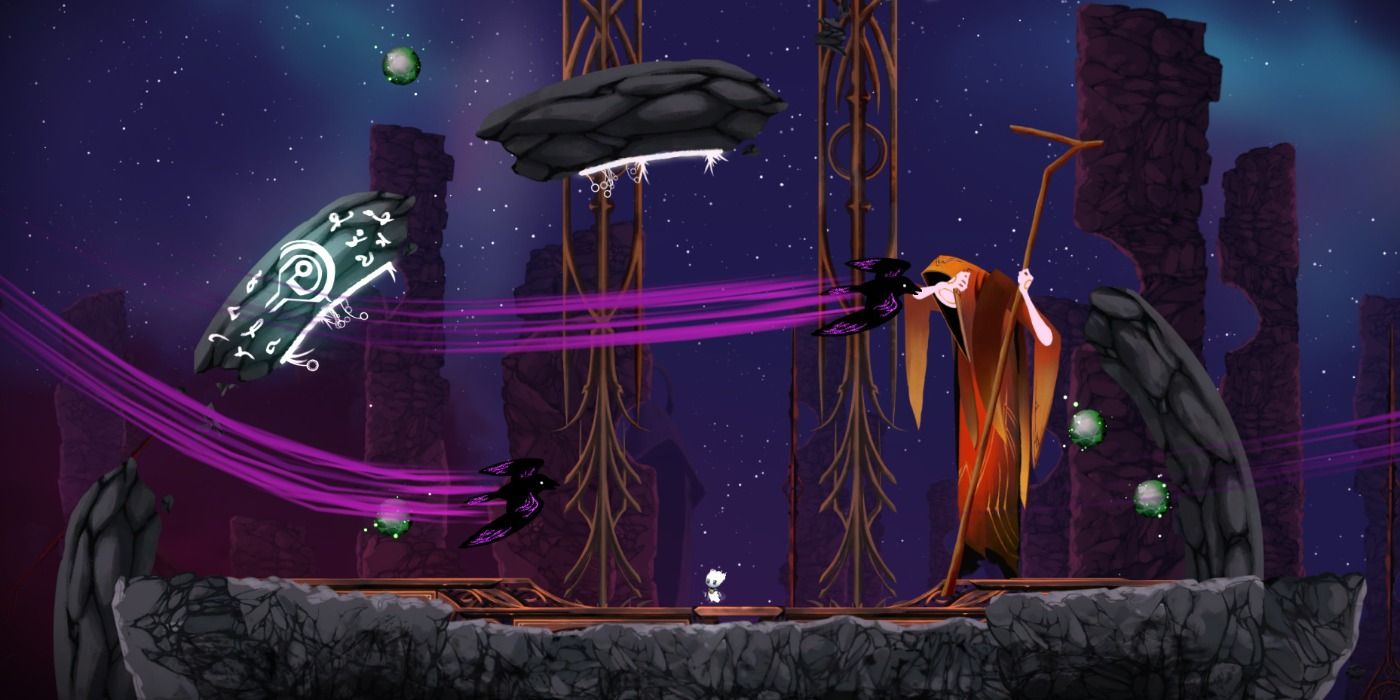The gaming world is full of cutesy indie platformers with a dark edge. Among them, Evergate manages to stand out from the crowd with its razor-sharp gameplay that manages to be challenging while keeping things engaging and fresh enough to prod the player into conquering its stages.
Evergate follows a lost spirit named Ki, who must travel through their own memories with the aid of a mysterious doorway known as the Evergate, before they can be reborn into the world. The player must guide Ki through a number of difficult platforming stages, with each one uncovering more of their memories, as they learn that there is more to their fate and the people they left behind than they initially realized.
In terms of gameplay, Evergate is a platformer in the same vein as indie titles like Celeste, but it has a gimmick that it plays to the hilt. Ki can project an aimable beam of light that can activate different objects around the map, so long as it also comes into contact with an energized part of the ground. Fortunately, the game slows down whenever the player activates the beam, so they have time to line up their shots while in the middle of jumping. The different items in each stage have their own effect, such as blasting Ki into the air, teleporting them to a new position, or transforming them into a firework that can fly for a short amount of time. This turns into stage into a complex game of Pool, as the player has to use the items around the stage to guide Ki to the goal, all of which alter his movements in different ways.
Evergate does an amazing job of keeping the beam gimmick fresh throughout its run, with some amazing level design and a steady influx of new objects throughout the stages. Evergate is broken down into a number of small stages with a few puzzles that the player needs to work out, so everything feels approachable and it never becomes too overwhelming. It’s also possible to quickly reset a stage with the push of a button, so players can jump straight back into the action if they screw up a run, which reduces the frustration factor significantly. It’s possible to unlock items that make things easier, but the player will need to go out of their way to collect items spread throughout the stage, so they will need to put the legwork in if they want a helping hand with the harder stages later on.
The visuals in Evergate are gorgeous, especially the otherworldly transitions as Ki travels from stage to stage. There aren’t many characters to speak of, but the worlds themselves are a treat to behold. The cartoon graphics with a dark twist are reminiscent of Hollow Knight, except with a more ethereal feel.
Evergate stumbles a bit when it comes to the story, which is mostly told through brief cutscenes and some (admittedly gorgeous) animated segments between stages. The story isn’t particularly interesting and it mostly exists as a framework for the game to exist. Fortunately, it’s easy to skip through these scenes with the push of a button. The other issue with Evergate is that isn’t a particularly long game for those who don’t care about seeking out every item and upgrade, but we should point out that it’s a budget title, so this is more forgivable given the price point.
Evergate is the ideal game for platforming fans who love challenging gameplay and ever-changing mechanics that keep things fresh throughout its runtime. The story is nothing new and its short runtime might not be satisfactory for some, but its beautiful graphics and tight gameplay make it an easy recommendation for fans of the genre.
Evergate is available now for Nintendo Switch and PC. Screen Rant was provided with a digital code for the PC version of the game for the purposes of this review.
About The Author

